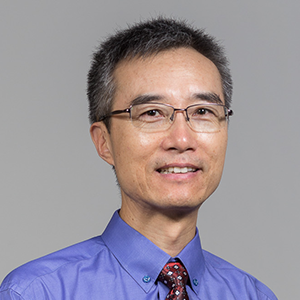
WANG Ye
Associate Professor- Ph.D. (Information Technology, Tampere University of Technology, Tampere, Finland, 2002)
- M.Sc. (Telecommunications, Braunschweig University of Technology, Braunschweig, Germany, 1993)
- B.Sc. (Telecommunications, South China University of Technology, Guangzhou, China, 1983)
Dr. WANG Ye is a tenured associate professor in the School of Computing at the National University of Singapore. He obtained his BSc in Telecommunications from South China University of Technology in 1983, his MSc in Telecommunications from Braunschweig University of Technology in 1993, and his PhD in Information Technology from Tampere University of Technology in Finland in 2002. He has worked as a member of the technical staff at Nokia Research Center in Tampere technical staff at Nokia Research Center, Tampere (1994 - 2002) before joining NUS in 2002. Dr. Wang's research has evolved from error robust audio streaming and low power media processing to Sound and Music Computing for Human Health and Potential (SMC4HHP). Dr. Wang's research has been consistently published in the top venues in multimedia and music information retrieval including ACM Transactions on Multimedia Computing, Communications, and Applications (ACM TOMM), ACM Multimedia (ACM MM), IEEE/ACM Transactions on Audio, Speech, and Language Processing, and the International Society for Music Information Retrieval Annual Conference (ISMIR), ACM ACCESS Conference on Computers and Accessibility (ASSETS). Dr. Wang has served as an editorial board member of the Journal of New Music Research, IEEE Transactions on Multimedia (TMM) as well as on the program committees of ACM MM and ISMIR. He has served as the general chair of ISMIR2017 (https://ismir2017.smcnus.org/) and TPC co-chair of ICOT2017 (http://www.colips.org/conferences/icot2017/). He has co-authored a number of Best Papers at ACM MM, ACM CHI, ISMIR and IEEE ISM. He was invited to give a keynote address at ISMIR 2014 on "Sound and Music Computing for Exercise and Rehabilitation" where he presented interdisciplinary projects he initiated and pioneered in collaboration with clinicians at Harvard Medical School in the USA, Singapore General Hospital, and Huashan Hospital in China. His current research theme is on Sound and Music Computing for Human Health and Potential. His most recent projects involve the design and evaluation of systems to support 1) auditory training and second language learning, 2) therapeutic gait training using Rhythmic Auditory Stimulation (RAS). Along this line, the interactive Rhythmic Auditory Cueing Evaluator (iRACE) project has received the first prize in the Asia Pacific Assistive, Rehabilitative, and Therapeutic Technologies Challenge 2015. At NUS, Dr. Wang has been successful in attracting external research grants from industry, such as Nokia and Smule, as well as grant agencies including A*Star, NRF, and MOE. He has supervised and graduated 11 PhD students and more than 20 MComp students at NUS. He is currently supervising six PhD students. He has played an active role in rendering service to the school/department, particularly in graduate student recruitment efforts, as well as to the international academic community. During his academic career at NUS, he has successfully transformed himself from an industrial researcher to an academic and an effective teacher. He has developed and has taught the first and only course on “Sound and Music Computing” in Singapore. Updated information about Dr. Wang's research group can be found here: https://smcnus.comp.nus.edu.sg.
RESEARCH AREAS
RESEARCH INTERESTS
Sound and Music Computing
Mobile and Wearable Computing
eHealth and eLearning
Audio Compression and Compressed Domain Audio Processing
Error Robust Delivery of Audio Content Over Wireless Packetnetwork
Perception-aware Low-power Media Processing
Designing Multimedia Systems for Education and Entertainment
RESEARCH PROJECTS
RESEARCH GROUPS
TEACHING INNOVATIONS
SELECTED PUBLICATIONS
- Robert J. Ellis, Yee Sien Ng, Shenggao Zhu, Dawn M. Tan, Boyd Anderson, Gottfried Schlaug, and Ye Wang 2015. A Validated Smartphone-Based Assessment of Gait and Gait Variability in Parkinson’s Disease. PLoS ONE 1010: e0141694. doi: 10.1371/journal.pone.0141694
- Xinxi Wang, David Rosenblum, Ye Wang, Context-Aware Mobile Music Recommendation for Daily Activities, ACM Multimedia 2012
- Xinxi Wang and Ye Wang. “Improving Content-based and Hybrid Music Recommendation using Deep Learning.” ACM Multimedia 2014
- Ye Wang, Min Yen Kan, Tin Lay Nwe, Arun Shenoy, Jun Yin, “LyricAlly: Automatic Synchronization of Acoustic Musical Signals and Textual Lyrics,” ACM Multimedia 2004
- Jun Yin, Ye Wang and David Hsu, “Digital Violin Tutor: An Integrated System for Beginning Violin Learners,” ACM Multimedia 2005
- Graham Percival, Ye Wang and George Tzanetakis, “Effective Use of Multimedia for Computer-Assisted Musical Instrument Tutoring,” ACM Workshop on Educational Multimedia and Multimedia Education EMME-2007
- Tin Lay Nwe, Arun Shenoy and Ye Wang, “Singing Voice Detection in Popular Music,” ACM Multimedia 2004
- Bingjun Zhang, Jialie Shen, Qiaoliang Xiang and Ye Wang, “CompositeMap: A Novel Framework for Music Similarity Measure,” ACM SIGIR 2009
AWARDS & HONOURS
Chitralekha Gupta, Haizhou Li, and Ye Wang (2017). Perceptual Evaluation of Singing Quality. Proceedings of 9th Asia-Pacific Signal and Information Processing Association, APSIPA ASC 2017, Kuala Lumpur, Malaysia (Best student paper award).
Shenggao Zhu, Boyd Anderson, Rob Ellis and Ye Wang. “Using Smartphones in Gait Analysis: An iOS-based Rhythmic Auditory Cueing Evaluation (iRACE) Mobile Application” the first prize out of the 38 shortlisted teams at the Asia Pacific Assistive, Rehabilitative and Therapeutic Technologies Challenge 2015 in Singapore, March 2015.
Zhe Xing, Xinxi Wang and Ye Wang. “Enhancing Collaborative Filtering Music Recommendation by Balancing Exploration and Exploitation,” 15th International Society for Music Information Retrieval Conference (ISMIR 2014), (Best paper award).
Yi Yu, Roger Zimmermann, Ye Wang and Vincent Oria. “Recognition and Summarization of Chord Progressions and Their Application to Music Information Retrieval” Multimedia (ISM), 2012 IEEE International Symposium on Multimedia (Best paper award).
Yinsheng Zhou, Graham Percival, Xinxi Wang, Ye Wang and Shengdong Zhao, “MOGCLASS: Evaluation of a Collaborative System of Mobile Devices for Classroom Music Education of Young Children,” ACM CHI 2011, 9 -12 May 2011, Vancouver, Canada, (Honorable Mention Paper Award of CHI2011).
Ye Wang, Min Yen Kan, Tin Lay Nwe, Arun Shenoy, Jun Yin, “LyricAlly: Automatic Synchronization of Acoustic Musical Signals and Textual Lyrics,” ACM Multimedia Conference, October 10-16, 2004, New York, USA, pp. 212-219 (Best student award).
COURSES TAUGHT

